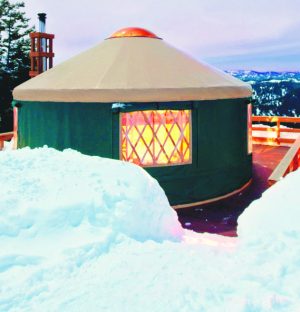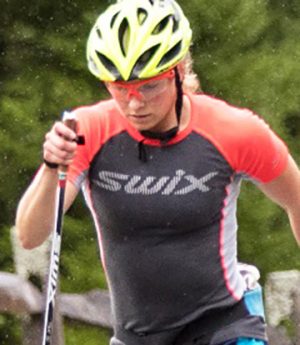June 13, 2012 (Gatineau, QC) – Later this week Marty and Kathy Hall are moving back to the United States after being Canadian residents for the past 27 years. The former head coach of both the American and Canadian national cross-country ski teams and current SkiTrax columnist, age-group racer and prolific web-forums poster, and his better half, are going home. They have sold their house on the edge of Gatineau Park, Quebec, and are decamping to Durham, NH, where they will live within walking distance of the University of New Hampshire, their alma mater.
He goes, at the age of 74, with the famous Marty Hall confidence, having decided, with his wife, that volunteering is how they would like to spend their retirement years and that possibilities for this at UNH greatly outnumber what might be available to them in Quebec, where they don’t speak the official language. “Whatever we get ourselves involved in,” he is certain, “will serve us well, and serve the students well.”
And the skiing? He counters with a figurative shrug. No, he won’t enjoy a four-minute drive to Gatineau Park ski trails any more, but Gunstock Nordic is less than an hour from Durham – and furthermore, if you look at results from those eastern collegiate ski carnivals you will see UNH up in the top five most of the time. “So, it’s possible,” he says. “I’m not worried.”
Late on a recent Saturday afternoon an array of ski paraphernalia that he won’t be taking with him was laid out on the front deck of Cathy and Ed Cottell’s house in Gatineau Park. The Cottells were hosting a farewell party for their friends, the Halls – potluck hors d’oeuvres, wine, beer. Guests were encouraged to take something: a pair of gloves or mitts, a base layer or a jacket, the Holstein-motif lycra or one of the other retro racing suits, the salopettes, the stone grinder, the 70s-era road bike that Marty was having a surprisingly hard time finding a home for.Eighty or so friends, former colleagues, ex-athletes and neighbours (among them some excellent cooks) had shown up. As Ian Rawes, who was first to speak when the tributes began, put it, “There are a lot of people who would like to pay their respects to Marty. And take a crack at him.”
![CCC Big Chill... (back row) Ian Rawes, Monica Rosenthal, Toni Scheier, Paul Graner, Kathy Hall; (second row) Kevin Jones, Brian Aller, Malcolm Hunter, Trice Cameron, Sheila MacDonald, Linda Landry, Louise Sanders, Al Pilcher, Richard Weber; (front row) Josee Auclair, Marty Hall [P] Maria Litva](http://skitrax.com/wp-content/uploads/2012/06/CCC-Group-DSC_0179.2.jpg)
“Is he awake now?” someone hollered.
Other jabs followed.
No wonder they are such a happy couple, it was reasoned: Marty travels so much – they may have been married for over 40 years but they have been together only about five.
Toni Scheier, long-time friend and former colleague at Cross Country Canada, referred to Hall’s distinctive bushy eyebrows as, “a genetic mutation that keeps the snow out of his eyes.”
Al Pilcher, who was a promising young Canadian racer in the 1980s, recalled his coach’s unambiguous reply when he (Pilcher) asked Hall why, after only one year on the senior national team, he was about to lose his carding, have much of his support withdrawn and be denied trips: “I don’t think you have any talent!” Or at least, it was further explained, not as much talent as another racer. (Pilcher notably recovered, in 1989 establishing a long-lasting high water mark for Canadian men at the World Championships with a 7th place finish in the 50 km. skate.)By the time Hall rose to adjust some details and tell a few stories of his own (one gem: yet again away from home coaching, he receives a long distance call from his wife, alone and in distress that water from melting snow is coming through their roof – “It’s falling on the television! What am I supposed to do?” Marty’s solution: “Move the television.”), his portrait had been vividly drawn by his Canadian friends: direct, self-assured, outspoken, committed; the brash American among polite Canadians; defiant opponent of doping; informal, generous, devoted to his athletes and to the concept of team.
It was nearly 8:30 (the invitations had specified: “4-7 p.m.”) and a clear, warm day was becoming a dark, cool night. Ed Cottell slipped quietly among the crowd with an armload of jackets and coats from his closet, draping them one by one over shoulders of the least warmly dressed. On the deck, Hall came to rest on what seemed to be, for him, a definitive point. Arriving in 1982 to take over a struggling Canadian national team, he carried with him a legacy of successes from his tenure with American program during the 1970s – and resolved to “never, ever” draw reference to that.
When, shortly after, the party moved inside to the warmth of the Cottell’s house, Hall came back to the same point in a conversation. “Whenever I talked about the (Canadian) program, I talked about ‘us’; I always used, ‘we’. . . I became a Canadian.”
- Cathy and Marty Hall © Maria Litva
- (l-r) Don Moxley, Kent Omholt-Jensen, Michael Egan © Maria Litva
- (l-r) Cathy Cottell, Linda Landry © Maria Litva
- Kitty Wilkens © Maria Litva
- (l-r) Larry Kerr, Catherine Blake, Eniko Vermes © Maria Litva
- (l-r) Natalya Kuziak, Linda Landry © Maria Litva
- Erik Petersen, Karen Nesbitt © Maria Litva
- Maggie and Richard Turcotte © Maria Litva
- (l-r) Bill Gregg and Don Moxley © Maria Litva
- (l-r) Cathy Cottell, Maria Litva (photographer) © Maria Litva
- (l-r) Kitty Wilkens, Michael Egan, Gail Extrand, Kent Omholt-Jensen © Maria Litva
- (l-r) Bev Scheier, Monica Rosenthal, Kitty Wilkens, Trice Cameron, Beth Moxley © Maria Litva
- (l-r) Petr Jakl, Marty Hall © Maria Litva
- Cathy and Ed Cottell © Maria Litva
- (back row) Ian Rawes, Monica Rosenthal, Toni Scheier, Paul Graner, Kathy Hall (second row) Kevin Jones, Brian Aller, Malcolm Hunter, Trice Cameron, Sheila MacDonald, Louise Sanders, Al Pilcher, Richard Weber (front row) Josee Auclair, Marty Hall, Linda Landry © Maria Litva
- Weathervane © Maria Litva






![National camp action [P]...](https://skitrax.com/wp-content/uploads/2019/08/Duluth-4-2019-08-08-at-10.46.51-AM-300x246.png)
![Matt Liebsch on the CXC Elite Team [P] CXC...](https://skitrax.com/wp-content/uploads/2019/08/Matt-Liebsch-CXC.2-525x700.4-300x267.jpg)
![Dan LaBlanc [P]...](https://skitrax.com/wp-content/uploads/2019/08/Dan-LaBlanc-img_1855.3.jpg)

![Ontario coach Petr Jakl (l) and Marty Hall [P] Maria Litva](http://skitrax.com/wp-content/uploads/2012/06/Jakl-Marty-DSC_0152.2.jpg)
![Cathy and Ed Cottell hosted the gathering at their lovely home in Chelsea, QC. [P] Maria Litva](http://skitrax.com/wp-content/uploads/2012/06/Cathy-and-Ed-Cottell-DSC_0106-1.2.jpg)
![Weathervane at the Cottell home... [P] Maria Litva](http://skitrax.com/wp-content/uploads/2012/06/Weathervane-DSC_0267.2.jpg)
![Cathy and Marty Hall [P] Maria Litva](https://skitrax.com/wp-content/uploads/2012/06/Cathy-MartyDSC_0179-298x2751-125x125.jpg)
![(l-r) Don Moxley, Kent Omholt-Jensen, Michael Egan [P] Maria Litva](https://skitrax.com/wp-content/uploads/2012/06/Moxley-Jensen-Egan-DSC_0210.2-125x125.jpg)
![(l-r) Cathy Cottell, Linda Landry [P] Maria Litva](https://skitrax.com/wp-content/uploads/2012/06/Cathy-Linda-Landry-DSC_0109-1.2-125x125.jpg)
![Kitty Wilkens [P] Maria Litva](https://skitrax.com/wp-content/uploads/2012/06/Kitty-Wilkens-DSC_0189.2-125x125.jpg)
![(l-r) Larry Kerr, Catherine Blake, Eniko Vermes [P] Maria Litva](https://skitrax.com/wp-content/uploads/2012/06/Kerr_Blake_Vermes-DSC_0102.2-125x125.jpg)
![(l-r) Natalya Kuziak, Linda Landry [P] Maria Litva](https://skitrax.com/wp-content/uploads/2012/06/Natalya-Kuziak-and-Linda-LandryDSC_0137-2.2-125x125.jpg)
![Erik Petersen, Karen Nesbitt [P] Maria Litva](https://skitrax.com/wp-content/uploads/2012/06/Petersen-Nesbitt-DSC_0129-1.2-125x125.jpg)
![Maggie and Richard Turcotte [P] Maria Litva](https://skitrax.com/wp-content/uploads/2012/06/Maggie_Richard-Turcotte-DSC_0148.2-125x125.jpg)
![(l-r) Bill Gregg and Don Moxley [P] Maria Litva](https://skitrax.com/wp-content/uploads/2012/06/Bill-Gregg_Don-Moxley-DSC_0184.2-125x125.jpg)
![(l-r) Cathy Cottell, Maria Litva (photographer) [P] Maria Litva](https://skitrax.com/wp-content/uploads/2012/06/Cathy-Maria-Litva-DSC_0107.2-125x125.jpg)
![(l-r) Kitty Wilkens, Michael Egan, Gail Extrand, Kent Omholt-Jensen [P] Maria Litva](https://skitrax.com/wp-content/uploads/2012/06/Wilkens_Egan_Extrand_Omholt-Jensen-DSC_0132-4.2-125x125.jpg)
![(l-r) Bev Scheier, Monica Rosenthal, Kitty Wilkens, Trice Cameron, Beth Moxley [P] Maria Litva](https://skitrax.com/wp-content/uploads/2012/06/Scheier_Rosenthal_Wilkens_Cameron_Moxley-DSC_0143.2-125x125.jpg)
![(l-r) Petr Jakl, Marty Hall [P] Maria Litva](https://skitrax.com/wp-content/uploads/2012/06/Jakl-Marty-DSC_0152.2-125x125.jpg)
![Cathy and Ed Cottell [P] Maria Litva](https://skitrax.com/wp-content/uploads/2012/06/Cathy-and-Ed-Cottell-DSC_0106-1.2-125x125.jpg)
![(back row) Ian Rawes, Monica Rosenthal, Toni Scheier, Paul Graner, Kathy Hall (second row) Kevin Jones, Brian Aller, Malcolm Hunter, Trice Cameron, Sheila MacDonald, Louise Sanders, Al Pilcher, Richard Weber (front row) Josee Auclair, Marty Hall, Linda Landry [P] Maria Litva](https://skitrax.com/wp-content/uploads/2012/06/CCC-Group-DSC_0179.2-125x125.jpg)
![Weathervane [P] Maria Litva](https://skitrax.com/wp-content/uploads/2012/06/Weathervane-DSC_0267.2-125x125.jpg)